Tue 21 Jul 2009
Movie Review: THE WIND AND THE LION (1975).
Posted by Steve under Action Adventure movies , Reviews[9] Comments
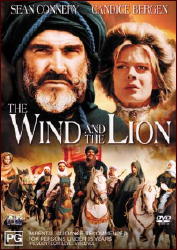
THE WIND AND THE LION. MGM, 1975. Sean Connery, Candice Bergen, Brian Keith, John Huston. Screenwriter & director: John Milius.
I’ve taken my time in getting my notes and opinions written up on this film, a semi-historical movie I watched about a week ago. It’s one that takes place during the tenure of Teddy Roosevelt in office of the President of the United States; or in other words, circa 1905.
There was at that time an actual American citizen kidnapped by a tribe of Berbers in Morocco, but the victim then was a man, and in the movie it is a woman (Candice Bergen) with two young children.
Doing the kidnapping is Mulay Hamid El Raisuli, Lord of the Riff, Sultan to the Berbers, Last of the Barbary Pirates (Sean Connery), and if Sean Connery can play El Raisuli as well as he does in The Wind and the Lion, why then, he can play almost anybody. (But we all knew that anyway, didn’t we?)
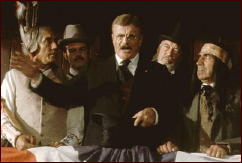
This causes a diplomatic crisis of huge international proportions. Almost as good as Sean Connery is in his role is Brian Keith in his, that of Teddy Roosevelt, and you should take it for granted that no one has or ever will play Teddy Roosevelt (in full imperial mode) as well as Brian Keith.
Global politics being what they were, both the French and Germans are involved in the attempt to negotiate the return of the kidnapped woman, Eden Pedecaris, but with Roosevelt’s “Big Stick” policy as backup plan, if you the viewer are ever in doubt as to whether or not the US Marines will be called in, you need not be concerned.
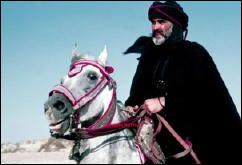
They are, and in full force. Part of the thrill of watching this movie is for the sheer adventure of it all. With the US in full cognizance of its new role in the world, the Marines are simply itching to take over, and eventually they do.
While John Milius is a strong right-of-center conservative — and if I’m in error about that, please let me know — his portrayal of the Moroccan Arabs and the plight of the nomadic tribes in the face of oncoming history feels (to me) both accurate and sympathetic.
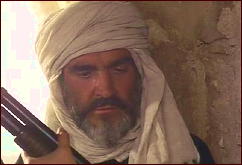
The thrust of the tale, of course, is the conflicting bond between El Raisuli and his prisoner, the outspoken and openly defiant Mrs. Pedecaris, who in turn grows to respect her captor and his increasingly desperate situation more than she ever realized she ever would or could.
And yet. All is well and good in my description so far, but there was much to this film that equally displeased me — well, no, disappointed is a far better word. Each scene was well-set and well-filmed, but I found there was no cohesive structure to the film, or at least not enough, and events that were meant to be personal were shot as if at arm’s length far too often, as it were — if not literally, then figuratively speaking.
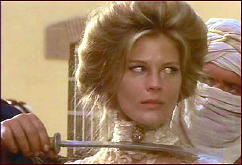
It is not clear (or not to me) how and why the Germans got so intimately involved in Raisuli’s capture at the end, but that Mrs Pedecaris had something to say about that was both rousing and satisfying.
If this sounds like a mixed review, I’m as surprised as you are. When I started writing up my thoughts about the movie, I was prepared to go almost totally negative, and I ended up far more positive than I expected.
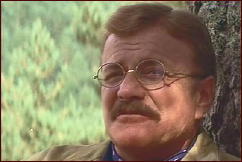
(I no longer plan out ahead of time what I am going to say in one of these reviews. After a certain amount of time has passed by, and this varies, I simply sit down and start typing.)
There are a lot of artfully created scenes in this movie, and I am sure that is why it received a considerable number of nominations for various awards or another. If you like a rousing adventure movie as much as the next guy, I think you’ll enjoy it as much as he does.
July 21st, 2009 at 10:20 pm
Steve
We discussed this film between us, and you know I love it with no apologies, but that said, I grant some of your reservations.
Some of the disjointed nature of the film is the result of mixing fiction and fact. The scenes of TR are almost all accurate and in many cases taken from direct quotes by the people involved (if not said in quite these circumstances), while the scenes with Connery and Bergen are almost all fiction. The rest are a mix of fact and fiction.
And of course in real life the Marines didn’t have to come to the rescue. Pedicaris and his stepson were ransomed quietly after having formed a real friendship with Raisuli, often called the last of the Barbary Pirates.
The Germans are supposed to be military advisers to the government, though why in French and Spanish Morocco the Germans would have such a strong presence has more to do with director and writer Milius using the climax as a ‘preview’ of the upcoming First World War than what happened.
That said such military advisers were not uncommon, many British ‘observers’ rode with both the Union and the Confederacy in our Civil War. Considering the Kaiser’s imperial ambitions the presence of the German advisers is more likely accurate than not.
Milius would be the first to call himself right of center, but he is far more a Libertarian than simply a right winger. He has great admiration for the Berbers and other such nomadic warrior tribes, and this film is rightfully embraced by the Islamic world as a fair and intelligent presentation of some aspects of their culture.
Keep in mind Milius wrote the Conan film. He has a genuine interest in barbarians, and warriors in general.
July 22nd, 2009 at 10:26 pm
David, is of course the “next guy” I referred to in the last paragraph of my comments!
We discussed the movie at length by email, but while he was aware of my reservations, he didn’t see the final form of my review until after it was posted. Nonetheless, it wouldn’t have come out the way it did without our hashing the movie over ahead of time, and I owe him a big Thank You on the results.
— Steve
July 23rd, 2009 at 6:29 am
I just thought it was a really neat swordfight movie.
Never could figure out though why the Marines were the dominant power when they marched in but outnumbered after Raisuli was captured. Wha’ hop’?
July 23rd, 2009 at 6:44 pm
Steve
Too kind words. I enjoyed helping — if I did.
Dan
I think Milius let a good scene confuse some viewers. When the Marines land and march in unopposed it isn’t because they are a superior force — it’s because no one, not even the American ambassador (Geoffrey Lewis) — was expecting them.
At the time the US was far from a world power, and despite the Spanish American War and our presence in China it was still a shock that we dared to play the imperial game the way the British or French would.
The scene where the Marines march in is meant to show how little they were expected — and how fast they move.
And since the whole business of the rescue is fiction with the Germans there largely to remind us soon we would become a major international power in a war against Germany it is mostly there for dramatic impact, not historical accuracy.
Anyway, though he was the American Consul Pedicaris wasn’t an American. He was British, which was actually common since we didn’t always have a presence in places where a consul was needed. In a few South American backwaters the British Consul was sometime American.
There were even cases on some Pacific Islands where some local European was accredited as the consul for several nations. Even today the Consular service doesn’t have someone in every outpost. There are even cases where locals are the consul. In Dallas in the seventies I knew a Frenchman who was the consul for three different African countries and two Asian nations, so even today it happens.
July 24th, 2009 at 7:55 am
Haven’t seen this, but I do have the novelization Milius made. It was a PBO. Forgot the publisher.
July 24th, 2009 at 10:23 am
Juri, in America at least, the novelization was published by Award Books, a very minor outfit.
It’s a decent read, but Milius seems put little effort or thought into it.
Btw, for all of the film’s flaws, I found it thoroughly enjoyable. In a masculine way it’s hugely romantic.
July 24th, 2009 at 1:55 pm
David,
I’m glad you clarified the balance-of-power thing since Milius didn’t.
November 3rd, 2009 at 9:27 pm
The movie, at least to me, wasn’t that intriguing.
Sorry…but good acting though. ;D
August 22nd, 2010 at 1:36 pm
Absolutely one of my favorite films. I have often wondered if the real theme of the movie (and the answer to some of the questions about why the Germans and why foreshadow WWI) isn’t spoken in the last line. Perhaps the “One thing worth losing everything for” is the freedom to do precisely what the Raisuli and TR do in the film … exactly what they want. I wonder if it’s about the last time in history that leaders could actually act in a manner that reflected only their personal agendas and not the attitudes of the world at large.
One of the best blendings of humor, action, and romance ever filmed and it suffers not at all for being “family friendly.” Wonderful restraint in showing the Raisuli in his more heroic mode, it’s half the film or more before that you think he’s a bit of a blowhard before that scene on the beach which has got to be dramatically one of the best action scenes ever filmed.
Great chemistry between Connery and Bergin without so much as kiss … that heat is a triumph of writing, directing and acting.
A last note … I use this film as an example of what it looks like when you have REAL horses, rather than movie horses, to deal with. The dynamic, always moving, barely in control animals they used are wonderful and it’s amazing to watch actors who could be comfortable doing a scene while their mount pranced and turned and bucked beneath them. The “one take” aspect of covering all this unpredictable movement with several cameras is a joy to behold.